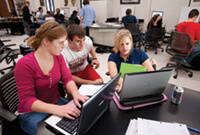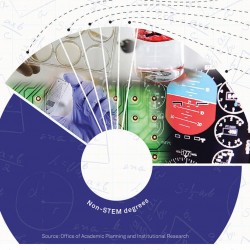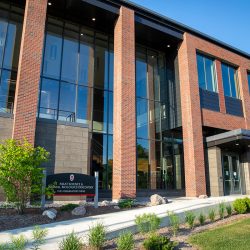Building a Better Biology
Boot camp program helps students navigate the biosciences.
Badgers who want to major in biochemistry should enroll in the College of Letters and Science — or maybe the College of Agricultural and Life Sciences. Botany is in L&S, but horticulture is in CALS. Biomedical engineering is in the College of Engineering, but biological systems engineering is in CALS. Molecular biology is in L&S, but microbiology is both there and in CALS. And those who want to major in just plain biology could go through L&S, CALS, or the School of Education.
Each year, some 1,300 students enroll in one of the UW’s thirty-one different biology-related majors, making biosciences one of the largest fields on campus — and one of the most confusing. The university’s Institute for Cross-College Biology Education (ICBE) hopes to ease the path for life-science students with a new Biology Boot Camp program aimed at incoming freshmen.
“Most high schools just teach plain biology, so students come here thinking they know about biology, but they don’t really know the full extent of the biological sciences,” says ICBE Director Teri Balser, who notes that the boot camp program will be modeled on similar efforts at other universities, including Michigan State and Minnesota. “We want to get a sense of what the pre-collegiate student needs, because coming to this huge campus can be a huge shock.”
Balser says that ICBE is developing the boot camp curriculum with a plan to deliver a pilot program next summer. It will likely run three days and include coaching and advising, as well as the chance to sit in on a lecture. The program’s initial funding is enough to cover one hundred participants and will focus on first-generation college students. I CBE hopes to find funding to expand the program in the future. “We want to give students a better idea of what majors they might be interested in and what research is,” Balser says. “We want to give them a foundation in the biosciences and prepare them for life in a biological career.”
Published in the Fall 2010 issue




Comments
No comments posted yet.